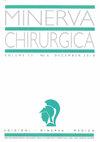Management of intra- and post-operative complications during TEM/TAMIS procedures. A systematic review.
IF 1.3
Q3 Medicine
引用次数: 4
Abstract
INTRODUCTION Transanal endoscopic microsurgery (TEM) is a safe procedure and the rates of intra- and post-operative complications are low. The information in the literature on the management of these complications is limited, and so their importance may be either under- or overestimated (which may in turn lead to under- or overtreatment). The present article reviews the most relevant series of TEM procedures and their complications and describes various approaches to their management. EVIDENCE ACQUISITION A systematic review of the literature, including TEM series of more than 150 cases each. We analyzed the population characteristics, surgical variables and intraoperative and postoperative complications. EVIDENCE GATHERING A total of 1043 records were found. After review, 1031 were excluded. The review therefore includes 12 independent cohorts of TEM procedures with a total of 4395 patients. The rate of perforation into the peritoneal cavity was 5.1%, and conversion to abdominal approach was required in 0.8% of cases. The most frequent complications were acute urinary retention (AUR, 4.9%) and rectal bleeding (2.2%). Less common complications included abscesses (0.99%) and rectovaginal fistula (0.62%). Mortality rates were low, with a mean value of 0.29%. CONCLUSIONS Awareness and knowledge of TEM complications and their management can play an important role in their treatment and patient safety. Here, we present a review of the most important TEM series and their complication rates and describe various approaches to their management.TEM/TAMIS手术中术中和术后并发症的处理。系统的回顾。
经肛门内窥镜显微手术(TEM)是一种安全的手术,术中和术后并发症的发生率很低。文献中关于这些并发症处理的信息是有限的,因此它们的重要性可能被低估或高估(这可能反过来导致治疗不足或过度)。本文回顾了TEM最相关的一系列手术及其并发症,并描述了各种治疗方法。证据获取对文献的系统回顾,包括TEM系列,每组超过150例。我们分析了人群特征、手术变量以及术中和术后并发症。证据收集共发现1043条记录。经审查,1031人被排除在外。因此,该综述包括12个TEM手术的独立队列,共有4395名患者。腹腔穿孔率为5.1%,0.8%的病例需要转腹腔入路。最常见的并发症是急性尿潴留(AUR, 4.9%)和直肠出血(2.2%)。较少见的并发症包括脓肿(0.99%)和直肠阴道瘘(0.62%)。死亡率低,平均为0.29%。结论对TEM并发症的认识和处理对TEM并发症的治疗和患者安全起着重要作用。在这里,我们回顾了最重要的TEM系列及其并发症发生率,并描述了各种治疗方法。
本文章由计算机程序翻译,如有差异,请以英文原文为准。
求助全文
约1分钟内获得全文
求助全文
来源期刊

Minerva chirurgica
医学-外科
CiteScore
1.40
自引率
0.00%
发文量
0
审稿时长
>12 weeks
期刊介绍:
Minerva Chirurgica publishes scientific papers on surgery. Manuscripts may be submitted in the form of editorials, original articles, review articles, case reports, special articles, letters to the Editor and guidelines. The journal aims to provide its readers with papers of the highest quality and impact through a process of careful peer review and editorial work.
 求助内容:
求助内容: 应助结果提醒方式:
应助结果提醒方式:


